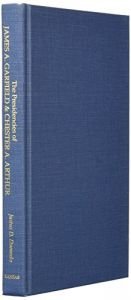The Presidencies of James A. Garfield & Chester A. Arthur
Blurb
This is the first single volume to focus on the presidencies of both James A. Garfield and Chester A. Arthur. Drawing from a host of studies on the foreign and domestic policies of the nation during the Gilded Age, as well as from his own primary research, the author presents a somewhat revisionist look at Garfield and Arthur—revisionist in that he gives the reader a renewed appreciation of both men. Far from being cynical spoilsmen or naive incompetents, individuals whose presidencies provide studies in ineptitude, Garfield and Arthur emerge as men of considerable ability. While making no claims of greatness, Doenecke maintains that each was a significant transitional figure, playing a crucial role as the institution of the presidency moved from the weak leadership of Andrew Johnson to the forceful direction of Theodore Roosevelt.According to Doenecke, Garfield saw the office of chief executive primarily in administrative terms, and his great battle was over keeping the power of appointment in his own hands. His victory over the Stalwarts enhanced both the power and prestige of the office. His knowledge of how government worked was unmatched; long before Woodrow Wilson made his mark, Garfield was "the scholar in politics." The diplomacy of Secretary of State James G. Blaine comes under critical scrutiny. Doenecke evaluates his performance in the Chile-Peru War (War of the Pacific), the Guatemala-Mexico dispute, the isthmian-canal issue, Irish-American activities in Britain, and efforts to secure markets in Korea.
,br>Garfield was assassinated less than six months after he entered office; he had yet to be tested on major issues of public policy. Chester A. Arthur was ill prepared to be chief executive, was in poor health much of the time while he was in office, and was faced with a hopelessly divided party. Nevertheless, he was one of the nation's great political surprises. His administration pioneered in the development of the navy, sought foreign markets for American surpluses, fostered civil-service reform, and pressed for a scientific tariff. Doenecke devotes one chapter to the spoils system and the background to the Pendleton Act, one to Arthur's strategy regarding the South, and then offers an in-depth analysis of diplomacy during Arthur's tenure.
During the presidencies of Garfield and Arthur, the United States attempted to intervene in a war between Chile and Peru, sought to turn Nicaragua into a protectorate, supplied leading advisers to Madagascar and Korea, and took a major part in the Congo conference of 1884. In examining these activities, even while pointing to uncoordinated statecraft and inept diplomacy, Doenecke challenges the long-held view that, from 1881 to 1885, the nation was withdrawn and insular. His fresh perspective on the Garfield and Arthur years will be of considerable interest to historians of the Gilded Age.

 English
English Español
Español Deutsch
Deutsch










Member Reviews Write your own review
Be the first person to review
Log in to comment